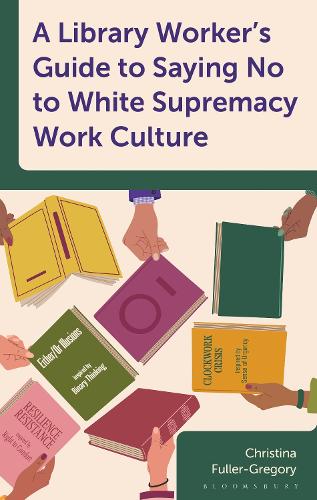
A Library Worker's Guide to Saying No to White Supremacy Work Culture
(Hardback)
Available Formats
Publishing Details
A Library Worker's Guide to Saying No to White Supremacy Work Culture
By (Author) Christina Fuller-Gregory
Bloomsbury Publishing PLC
Rowman & Littlefield Publishers
30th October 2025
United States
Classifications
Professional and Scholarly
Non Fiction
Ethnic groups and multicultural studies
020.8996073
Physical Properties
Hardback
128
Width 152mm, Height 229mm
Description
A call to action to dismantle the white supremacy work culture in libraries, and create an environment where EDI is not only talked about but realized.
Are the standards of professionalism that your organization has set still serving you Or might libraries and library workers challenge our long-held beliefs about what our work culture is or should be A Library Workers Guide to Saying No to White Supremacy Work Culture interrogates the historical foundations and present day consequences of a library work culture that is rooted in white supremacy. These white supremacy work culture habits show up in every aspect of library service, from programming, policy development, hiring practices, strategic planning, and even our ways of communicating and engaging. Even as libraries and library workers have been intentional in introducing and developing practices that center equity, diversity, and inclusion, the quiet intersectionality of white supremacy work culture coupled with our professional standards of librarianship have informed our internal work practices, shaping our perspectives and perceptions around what it means to be a good librarian.
Library workers and libraries are already having authentic and challenging conversations about the impacts of equity, diversity, and inclusion on library services. However, these conversations are often external in nature, guided by a solidly patron-centric focus. This book challenges libraries and librarians to turn inward to examine the oppressive internal systems that libraries have developed, sustained, and promoted.
Using Tema Okuns seminal research on white supremacy culture as inspiration A Library Workers Guide to Saying No to White Supremacy Work Culture will reimagine the reader as an active participant in both discovering and addressing how the aspects of white supremacy culture inform our library work.
Reviews
Christina Fuller-Gregorys book, A Library Worker's Guide to Saying No to White Supremacy Work Culture, could not be more timely. In a period of our history where too many state governments and elected officials are encouraging the banning of books that do not toe their preferred ideological line, Fuller-Gregory is offering a road map for libraries and librarians committed to fostering curiosity, lifelong learning, and doorways to a wider world. With a kind and encouraging tone, Fuller-Gregory guides the reader through specific questions and action steps to support a library culture that promotes diversity, inclusion, and equity at a time when these values are more critical to an open democracy than ever before. -- Tema Okun, author of The Emperor Has No Clothes: Teaching About Race and Racism to People Who Dont Want to Know, and the article White Supremacy Culture
Author Bio
Christina Fuller-Gregory is principal consultant and Founder of Fuller Potential Consulting,a consultancy at the forefront of preparing individuals and organizations to harness the power of authentic belonging. Growing up in the Upstate of South Carolina as the daughter of a Library Administrator Christina Fuller-Gregory always knew two things 1) that she would never be a librarian like her mother and 2) that after attending countless library programs on the weekends, her least favorite place was the library. Luckily, an adult Christina discovered that she was wrong on both counts. She did, in fact, become a librarian like her mom, and Libraries would ultimately become her Third Place. Today, Fuller-Gregory uses her lifelong relationship with Libraries to inform her work as a people-driven, community-centered library leader. Christina has been recognized as an American Library Associations Emerging Leader, shes acted as a committee member and chair for numerous library committees, and was recognized for her work in the equity space by Library Journal when she was named a Mover & Shaker. She is a highly sought-after speaker and consultant, and her writing has been featured in numerous publications. Led by Fannie Lou Hamers belief that Nobodys free until everybodys free, Christina's research and writing is driven by a desire to see Libraries develop strategies for positively shifting their organizational purpose.
